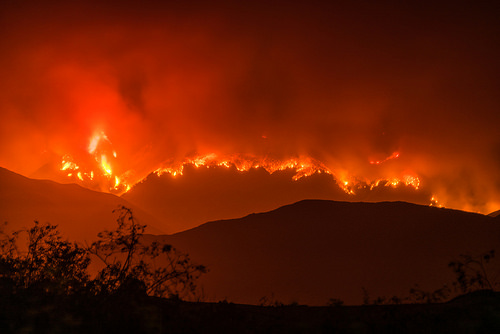I’m going to try something for a while, in an effort to engage more constructively with Scripture, rather than only writing about the frustrations I have. I would to build up what is good, not just tear down what is bad. I will still write about social issues and the arts as time allows, but I will be writing each weekend on the lectionary Scriptures for the weekend. I hope to make these messages relevant to current times and to a wider audience to the extent I can. Hopefully, they are interesting and engaging and challenging. Both believing and nonbelieving readers are invited to engage. If I was leading a church right now, this might be the kind of thing I would preach.
(This week’s readings can be found here. This message will mainly focus on Ezekiel 33:7-11.)
This week, as Hurricane Irma bears down on Florida, leaders and weather forecasters have warned citizens in the strongest possible terms to evacuate. “Get out now,” they said. “There will be a period of time with no emergency services. You will be alone. This storm will take lives. Don’t take your chances with it.”
In my state of Montana, we are having the opposite problem. Huge fires have been bearing down on our state, destroying homes and forests and even a much-beloved historic lodge in Glacier National Park. Several areas are in evacuation. Local firefighters have said, “When we say, ‘Get out now,’ that’s what we mean.” But not everyone is ready to go, and as a result several homes burned only twenty or thirty minutes after the occupants fled.
In times of natural disaster, it is not always stubbornness that leads people to stay in harm’s way. Sometimes jobs hang in the balance. Other times poverty or lack of a vehicle hinders people from leaving. Sometimes the safety of pets or other family members keeps people close to home despite the threat. But there is certainly a portion of the public who hunkers down out of pride, ignoring warnings of danger.
Ezekiel lived in such a time as this. During his time as an active prophet (593-571 BC), as a result of their sin the Northern Kingdom of Israel had already fallen to the Assyrians, and the world had just lived through a time of empire upheaval as Egypt and Assyria’s dominance was challenged by the Babylonians. In 597, Babylon carried off ten thousand citizens of Judah, including Ezekiel, in exile. The final fall of Jerusalem occurred in 586 BC. This was a time of fearful, direct military onslaught. It was like ISIS had taken over your city. Direct, mortal threat. Captivity and bondage. It was also a time in which Ezekiel was called to publicly and courageously challenge the people of Judah about their sin and the natural consequences of it–the judgment of God.
To us today, the idea of judgment is offensive. How dare God judge us? The people of Judah had the same response. Objecting to this judgment, they said to Ezekiel, “The way of the Lord is not just” (33:17 NIV). Many today say the same. In response, I would say two things. First of all, note that the judgment that Ezekiel is speaking here is against the people of faith. It is against the people who have been given the Word of God and been entered into the covenant and should know better. Likewise, our supporting passage from Matthew 18:15-20 deals with the confrontation of sin within the Church.
Do we really object to this? I have many secular readers, and essentially, they say the same thing. They say, “Why don’t Christians live up to what they are supposed to stand for?” Well, the Bible agrees. The Bible is always hardest on the religious people–the ones who should know better. If you’re reading this and you are a Christian, this can be a hard pill to swallow. Most of us are far more used to diatribes against the godless unbeliever than we are to talking of judgment against the believer. But an honest assessment of Scripture forces us to realize God is indeed much harder on believers than unbelievers in prophecy.
Second, we are disturbed by biblical talk of judgment–and there is plenty of conversation to be had around that topic and the questions raised by it–but for the moment I think it is most helpful to think of judgment as “natural consequences.” Sin is violence to God’s creation (and other humans) and to our relationship with God. That violence is like a tear in the fabric of the universe. It necessarily brings about consequences. We can think in terms of a modern parallel: Scientists today tell us that a significant portion of the global warming we experience on earth has preventable human causes. When humans emit an unnecessarily high amount of greenhouse gases, that leads to outcomes like rising temperatures, drought, famine, increased storm intensity, wildfires, polluted air, and many other negative effects. Those things are natural consequences of the violence that is done to God’s good creation through not taking care to prevent that harm which could be prevented. Those things are natural consequences of not being a good steward of God’s creation, something really all of us in the West (and other industrialized nations) have contributed to–even those friendly to environmental stewardship.
If the sin of causing a tear in the fabric of environmental well-being should naturally affect God’s creation, why shouldn’t the tear in the fabric of human relationships? This is a basic principle. We can get weighed down in trying to understand the minutiae of biblical commands–and there is a time and place for that discussion(s)–but for now we simply need to acknowledge the basic idea that a tear in relational wholeness is the essence of what sin is.













